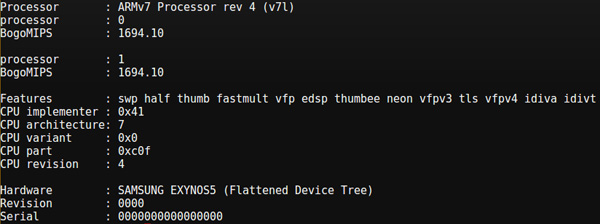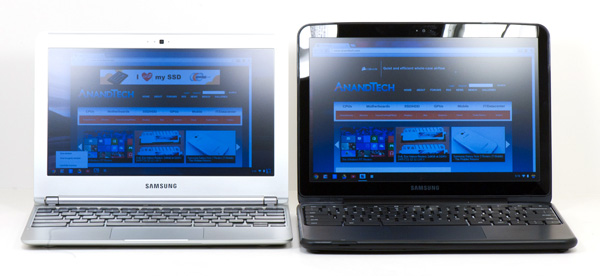Samsung Chromebook (XE303) Review: Testing ARM's Cortex A15
by Anand Lal Shimpi on October 31, 2012 9:00 AM ESTPerformance: Atom vs. ARM's Cortex A15
In our iPhone 5 review I included this crude diagram comparing the high level micro-architecture layouts of the current crop of mobile CPU cores. While most of the cores looked fairly similar, the one to really stand out is ARM's Cortex A15. A three issue, OoO core, the Cortex A15 was designed to put ARM in a completely new performance category.

For 2013, the Cortex A15 is expected to be the ARM CPU core of choice for the next wave of smartphone and tablet SoCs. NVIDIA's Wayne should integrate multiple Cortex A15s as well as competing solutions from Samsung and TI. Samsung's Exynos 5 Dual, found in the new Chromebook, integrates two ARM Cortex A15 cores running at 1.7GHz. As our first experience with a Cortex A15, I wanted to get a good idea for how it would compare to Intel's Atom. And now me comparing to the older Chromebook 500 makes sense. The Atom N570 in the older Chromebook is the closest approximation we have to the currently shipping Atom based mobile SoCs. There are a number of enhancements to the newer chips (particularly when it comes to power consumption), but the base core is very similar. It's clear that the Sandy Bridge Celeron based Chromebook is faster than this new Cortex A15 design, but how about the old dual-core Atom model?

As Chrome OS is built around the Chrome browser, our tests had to be largely JavaScript based unfortunately. The good news is that even given the nature of the benchmarks, we're able to get a good feel for performance between the two SoC platforms. Both systems were running the latest version of Chrome OS at the time of publishing.
| Samsung Chromebook Performance Comparison | ||||||
| SunSpider 0.9.1 | BrowserMark | RIABench Focus Tests | Kraken | |||
| Atom N570 1.66GHz | 1034.3 ms | 152780 | 1968 ms | 14229.5 ms | ||
| Exynos 5 Dual 1.7GHz | 690.5 ms | 217031 | 1192 ms | 9733.2 ms | ||
The Cortex A15 is fast. Across the board we're seeing a 40 - 65% increase in performance over a dual-core Atom. Although it's not clear how performance will be impacted as companies work to stick Cortex A15 based SoCs in smartphones with tighter power/thermal budgets, in notebooks (and perhaps even tablets) the Cortex A15 looks capable of delivering a good 1 - 2 generation boost over Intel's original Atom core.
The IE10 browser tests tend to agree with our JavaScript performance tests, although the CSS Maze Solver benchmark shows a huge advantage for ARM over Intel's Atom here.
| Samsung Chromebook Performance Comparison | ||||||
| IE10 Bubbles Test | IE10 Fishbowl | IE10 Maze Solver | ||||
| Atom N570 1.66GHz | 11 fps | 5 fps | 45 seconds | |||
| Exynos 5 Dual 1.7GHz | 17 fps | 8 fps | 17 seconds | |||
GPU performance is an even bigger advantage for the Exynos 5 Dual over Intel's old Atom N570 (GMA-3150 GPU). I ran three different webGL tests, each of which showed just how bad the old Atom GPU core was.
| Samsung Chromebook GPU Performance Comparison | ||||||
| WebGL Solar System | WebGL Cubes (500) | WebGL Aquarium (50) | ||||
| Atom N570 1.66GHz | 2 fps | 10 fps | 2 fps | |||
| Exynos 5 Dual 1.7GHz | 22 fps | 28 fps | 38 fps | |||
This comparison isn't really all that fair as the newer Atom cores use Imagination GPUs, although even then they are using relatively underpowered solutions compared to what Samsung is shipping on the Exynos 5 Dual.
The more relevant conclusions here apply to the CPU comparison. Next year Intel is expected to introduce its first new Atom core since the platform's introduction five years ago. The new architecture will bring an Out of Order execution core as well as a tangible performance increase. The question is whether or not this will be enough to fend off advances from Cortex A15 based designs.

The new Chromebook (left) vs. the old Atom based Chromebook (right)
In our Surface review I looked at Clovertrail Windows 8 tablet performance and put it a good 40%+ faster than NVIDIA's Tegra 3. If ARM's Cortex A15 is able to outperform Clovertrail by a similar margin, it could make the next generation of Windows RT tablets even more attractive. Keep in mind that we're looking at an older Atom platform here and not Clovertrail, so the performance deltas could shrink a bit.











149 Comments
View All Comments
zappb - Wednesday, October 31, 2012 - link
looks awesome - between this and the Nexus 10Flunk - Wednesday, October 31, 2012 - link
I recommend the Nexus 10, better screen and OS. ChromeOS is a real turkey.quiksilvr - Wednesday, October 31, 2012 - link
It really boils down to what you need. If you can live without a keyboard, get the Nexus 10. If you are on a budget, get this. If you want a keyboard and are willing to shell extra dough, get the Nexus 10 and a bluetooth keyboard.B3an - Wednesday, October 31, 2012 - link
He wasn't talking about keyboards and form factors. Chrome OS is almost completely useless for anything more than browsing the net. It's about equivalent to a basic feature phone in capability. It's for such a small niche, about the only people i could see buying Chrome OS notebooks are extremely poor students, and even then it probably wont do everything they want.jeffkro - Wednesday, October 31, 2012 - link
Another niche market is for people that do online investing and banking with significant assets. The added security of chrome OS is well worth having for $250 you won't find much cheaper insurance. Windows is just not safe for online financial transactions, which of course the poor student doesn't have to worry about.jeffkro - Wednesday, October 31, 2012 - link
By the way I find google docs to be pretty useful for productivity. I used to use open office and since I made the switch I haven't looked back. Netflix not being supported on the ARM version is kind of a bummer though. I think Google should make sure that Hulu, Netflix, and Amazon streaming all work as this definitely fits under the umbrella of cloud computing.damianrobertjones - Thursday, November 1, 2012 - link
Windows is safe... Don't run as full admin and maybe the user might have some common sense not to visit porn sitesklmccaughey - Thursday, November 1, 2012 - link
No, they can use a Chromebook to visit porn sites or any other activity (long list) that might get them on trouble in Windows.I maintain the computers (just) in my house and home office, and for one user I really wish he had a Chromebook and not a Windows laptop - I keep having to restore it from image.
Oh and I use Windows 7 x64 as my main machine, with Ubuntu VM for development.
Wolfpup - Friday, November 2, 2012 - link
Nothing wrong with porn sites...like any other business they're not especially wanting to screw over their customers.Sabresiberian - Friday, November 2, 2012 - link
ChromeOS is NOT more secure than Windows. You are putting too much stock in anti-Microsoft blather from Google. Might as well listen to Apple's opinion of Windows.Does this SoC even have the hardware security features built into Intel and AMD x86 chips (AES, Intel Secure Key, OS Guard)? I don't think it does. ChromeOS might require different methods to crack, but it is not more secure, and the hardware of the Chromebook is less secure.
Besides, I'd imagine any successful investor is going to be using something a lot more satisfying than a tiny, cheap netbook variation with a so-so screen.